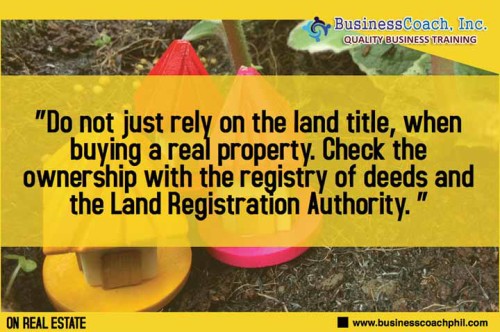Landlines: (02) 8.727.56.28 / (02) 8.569.78.84 /
(02) 8.569.46.90 / (02) 8.727.88.60
Mobile Nos: Globe: 0915.205.0133 / Smart: 0908.342.3162 / Sun: 0933.584.7266
How to Buy and Sell Real Estate Properties in the Philippines
The real property business is constantly on the upswing. Everywhere you go, you see new structures being built. You don’t have to be a billionaire to enter this business but it does need substantial capital. Still, it is possible for a middle income person to save up enough after several years to begin in this business.
Acquiring and selling properties is a solid business. In most cases, property appreciates in value. You also have plenty of options; you can deal in raw land or developed properties depending on your skill and inclination. Real estate is the most durable of assets and they can easily be used as collateral in case you need cash.
There are various classifications of properties. There are residential, recreational, commercial, agricultural, industrial, or memorial properties. From these sub-categories, and depending on your capital, you may start buying and selling real estate properties as a business.
In buying properties there are so many factors that must be considered. Firstly, the place must be accessible by public and private transport. The value too is higher if it is near shopping centers, schools, churches, markets, hospitals, or banks.
Secondly, there must be amenities. Today, almost all of those being developed have clubhouses, gyms, parks and playgrounds, basketball courts, or swimming pools. Such features are now considered necessities.
Lastly, take note of the general condition of the surrounding neighbourhood. Assess if the place is safe, secure, clean, and not flood prone.
Here are some important tips on how to buy real estate properties at a bargain:
● Know where to look for properties to buy. You may find them in newspapers or in the internet for properties under foreclosure. It is advisable, too, to concentrate mostly on people who want to sell in a hurry.
● Beware of smokes and mirrors. Do not just believe what the seller is claiming. Visit and inspect the property you are buying. Interview neighbors to counter-check claims. Also ask opinions from property experts in the area.
● Verify the ownership of the property. Do not just rely on the land title. Check the ownership with the registry of deeds and the Land Registration Authority.
● Have an experienced licensed appraiser assess the value of the property. You may think you have hit the jackpot but there may be factors that you have not taken into account. It is best to get the services of a professional in the field to make sure of your estimate.
● Check if there are claims against the property. Examine the title if there are liens or encumbrances that may affect the value of the property.
● Drive a hard bargain. Negotiate for more discounts or incentives. Never accept the first asking price for it is almost certain that you can haggle for less. Remember that the key to selling at a profit is buying low in the first place.
● Read everything before signing contracts and papers. Consult a lawyer that is experienced in real property transactions. It is false savings to save on legal fees and then suffer from legal problems later on.
● Give your payment only to the owner of the property, or to someone with a certified authority to collect. Always ask for receipts and receiving copies.
After buying properties, you have the following options in selling them:
● Sell as is. You may look for properties on sale, and then sell immediately to those who make the best offer. There is a smaller margin here but you can make up for it by having a faster turnover.
● Subdivide then sell. Here you may buy big lots which you can subdivide, and sell into smaller and more affordable chunks.
● Improve then sell. You may purchase an old property, renovate it then sell at high price. There are also those who buy houses or condominium units, furnish the place, and then sell them at a good price.
● Build then sell. If you have sufficient funds, you may buy residential lots, and then build houses to sell to prospective buyers. You may also build stalls in commercial lots, or warehouses in industrial lots, which you may sell later to earn you big bucks.
● Develop then sell. You may buy raw lands, which you then develop into several housing units. Others buy big lots within the city, which they develop into condominiums or townhouses, and sell to prospects at high price.
Engaging in the buying and selling of real property can be your path to fortune but there are many pitfalls to avoid. Learn as much as you can before risking your hard earned cash. BusinessCoach, Inc., a leading business seminar provider, conducts seminars on how to buy and sell real estate properties.
Click here to view details of the training program: How to Buy and Sell Real Estate Properties >>>
*Originally published by the Manila Bulletin. Written by Ruben Anlacan, Jr. (President, BusinessCoach, Inc.) All rights reserved. May not be reproduced or copied without express written permission of the copyright holders.
You might also like:
How to Start Selling Real Property »
Starting an Apartment Rental Business »



